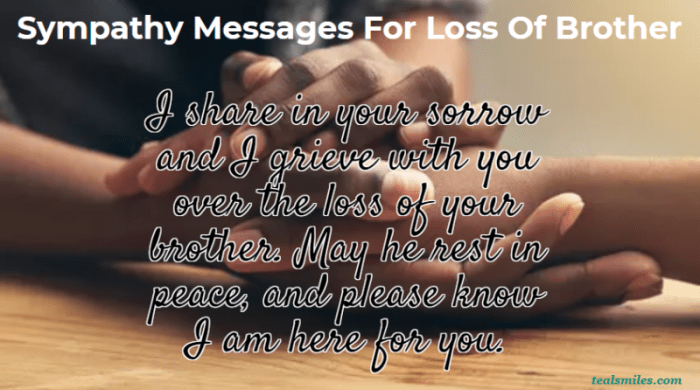In the face of a brother’s passing, words often fail to capture the depth of sorrow and loss. Yet, condolence messages serve as a beacon of comfort, a gentle touch that acknowledges the pain and offers solace during this challenging time.
These messages are not mere formalities; they are heartfelt expressions of sympathy and support, a testament to the enduring bond of brotherhood.
Condolence messages come in various forms, from written letters to heartfelt phone calls and personal visits. Each gesture, no matter how small, conveys a profound message of care and understanding. They are a reminder that the bereaved are not alone in their grief, that they have a community of loved ones who share their sorrow and stand ready to offer support.
Introduction

Condolence messages for a brother serve as expressions of sympathy and support during a time of profound grief and loss. When a brother passes away, the impact on the family and loved ones is immense, and offering condolences can provide comfort and solace.
Expressing condolences is a way to acknowledge the pain and sorrow experienced by the bereaved family. It demonstrates empathy, understanding, and a willingness to share in their grief. Whether through written messages, phone calls, or personal visits, conveying condolences helps strengthen the bonds of love and support during this difficult time.
Ways to Convey Condolences
There are various ways to convey condolences to a grieving family or individual. Each method has its own significance and appropriateness, depending on the circumstances and the relationship between the sender and the bereaved.
- Written Messages: Written messages, such as sympathy cards or letters, allow for a more personal and thoughtful expression of condolences. They provide an opportunity to share memories, offer words of comfort, and express support. The written form allows the sender to carefully choose their words and convey their emotions in a meaningful way.
- Phone Calls: Phone calls can be a direct and immediate way to offer condolences, especially when the sender lives far away or is unable to visit in person. A phone call allows for a more personal connection and the opportunity to express empathy and support in real-time. It also provides an opportunity for the bereaved to share their thoughts and feelings.
- Personal Visits: Personal visits are the most intimate and supportive way to convey condolences. Visiting the bereaved family or individual in person allows for physical presence, hugs, and a shared sense of grief. It is an opportunity to offer comfort, listen to their stories, and provide practical support, such as helping with arrangements or running errands.
Elements of a Condolence Message
When composing a condolence message for the loss of a brother, there are several key elements to consider to ensure that your message is both meaningful and supportive.
Expressing Sympathy
Begin your message by expressing your heartfelt sympathy for the loss of their brother. Use genuine and sincere words to convey your understanding of their pain and grief. Some examples of phrases you can use include:
- “I am deeply sorry to hear about the passing of your brother.”
- “My heart goes out to you and your family during this difficult time.”
- “I extend my deepest condolences for the loss of your beloved brother.”
Offering Support
Offer your support and let them know that you are there for them during this challenging time. Reassure them that they are not alone and that you are willing to provide whatever assistance they may need. Some ways to offer support include:
- “Please know that I am here for you if you need anything at all.”
- “I am just a phone call or text away if you need someone to talk to or need any practical help.”
- “I would be happy to assist with any arrangements or errands that need to be taken care of.”
Sharing Memories
If you had the opportunity to know their brother, share a fond memory or anecdote that highlights their positive qualities or the special bond you shared. This can bring comfort and remind them of the beautiful moments they shared together.
Some examples include:
- “I remember the time when your brother and I went on that fishing trip together. We had such a great time.”
- “Your brother was always the life of the party. He had a contagious laugh and a way of making everyone feel happy.”
- “I will always cherish the memories of our childhood together, playing in the backyard and getting into all sorts of mischief.”
Importance of Being Genuine
Above all, it is essential to be genuine and sincere in your message. Your words should come from the heart and reflect your true feelings of sympathy and support. Avoid using generic or clichéd phrases that may come across as insincere or impersonal.
Types of Condolence Messages
Condolence messages can vary depending on the relationship between the sender and the recipient. Tailoring your message to the specific audience is essential to ensure it resonates with them and offers genuine comfort during their time of grief.
Family Members
When sending a condolence message to a family member, express your heartfelt sympathy and acknowledge the loss of their loved one. Share memories or anecdotes that highlight the positive impact the deceased had on your life and theirs. Offer your support and let them know you are there for them during this difficult time.
- Example: “Dear [Family Member’s Name], I was deeply saddened to hear about the passing of your beloved [Name of Deceased]. [Name of Deceased] was a remarkable person who touched the lives of many with their kindness and generosity. I will always cherish the memories we shared together. My thoughts and prayers are with you and your family during this challenging time. Please know that I am here for you if you need anything.”
Friends
When offering condolences to a friend, express your sympathy and acknowledge the unique bond you shared with the deceased. Share fond memories or experiences that highlight the friendship you had. Offer your support and let them know you are there to listen and provide comfort during their time of grief.
- Example: “Dear [Friend’s Name], I was heartbroken to hear about the loss of your dear friend, [Name of Deceased]. [Name of Deceased] was a true gem, and I will always treasure the memories we created together. Our friendship meant the world to me, and I will miss [Name of Deceased] dearly. Please know that I am here for you during this difficult time. Lean on me whenever you need a listening ear or a shoulder to cry on.”
Colleagues
When expressing condolences to a colleague, acknowledge the professional relationship you shared with the deceased and highlight their contributions to the workplace. Offer your support and let them know you are there to help in any way you can during this challenging time.
- Example: “Dear [Colleague’s Name], I was deeply saddened to hear about the passing of our esteemed colleague, [Name of Deceased]. [Name of Deceased] was a dedicated and talented professional who made significant contributions to our team. Their expertise and dedication will be greatly missed. My thoughts and prayers are with you and your family during this difficult time. Please let me know if there is anything I can do to support you during this challenging period.”
Acquaintances
When sending a condolence message to an acquaintance, express your sympathy and acknowledge the loss of their loved one. Keep your message brief and respectful, offering your support and letting them know you are thinking of them during this difficult time.
- Example: “Dear [Acquaintance’s Name], I was saddened to hear about the passing of your [Relationship to Deceased], [Name of Deceased]. Although I did not know [Name of Deceased] well, I know they were a special person who meant a lot to you. My thoughts are with you and your family during this challenging time. Please accept my sincere condolences.”
Writing Tips for Condolence Messages
When writing a condolence message, it’s important to express your sympathy and support in a genuine and heartfelt way. Here are some tips to help you write an effective condolence message:
Use Clear and Concise Language
Use clear and concise language that is easy to understand. Avoid using jargon or technical terms that the recipient may not be familiar with.
Avoid Clichés and Platitudes
Avoid using clichés and platitudes, such as “I know how you feel” or “Everything happens for a reason.” These phrases can come across as insincere or dismissive.
Structure Your Message
Structure your message with an opening, body, and closing. The opening should express your sympathy and support, the body should share a memory or anecdote about the deceased, and the closing should offer words of comfort and hope.
Sample Condolence Messages

Expressing sympathy and offering comfort during a time of grief is essential. Here’s a collection of sample condolence messages that can serve as inspiration or templates for various situations:
For a Brother Who Has Passed Away
When a brother passes away, it’s natural to feel overwhelmed with grief. Here are some heartfelt messages to convey your condolences:
- “To my dearest brother, your presence brought joy and laughter to our lives. Your absence leaves an irreplaceable void. May your soul find eternal peace.”
- “Your brotherly love and guidance shaped me into the person I am today. Though you’re gone, your legacy lives on in my heart. May you find comfort and happiness in the afterlife.”
- “My dear brother, we shared countless memories, from childhood adventures to adulthood milestones. Your passing leaves a profound emptiness. May your spirit soar high and watch over us.”
For a Brother’s Spouse Who Has Passed Away
Losing a spouse is a devastating experience. Offer your condolences with these messages:
- “To my dear brother-in-law/sister-in-law, your unwavering love and devotion to my brother/sister were an inspiration to all who knew you. May you find solace in the memories you shared.”
- “Your spouse was a pillar of strength and support for my brother/sister and our family. Their passing leaves a deep void. May their soul find eternal peace and happiness.”
- “The bond you shared with my brother/sister was a testament to true love and companionship. Their passing is a profound loss, but their love will continue to live on in our hearts.”
For a Brother’s Child Who Has Passed Away
The loss of a child is an unimaginable tragedy. Offer your condolences with these messages:
- “To my dear brother/sister, there are no words that can truly express the pain you’re going through. Your child’s life was a precious gift, and their memory will forever be cherished.”
- “Your child brought immense joy and love into our lives. Their passing leaves a profound emptiness. May you find comfort in the memories you shared and the love that surrounds you.”
- “Your child’s life was a testament to the power of innocence and wonder. Though their time on earth was short, their impact on our hearts will be everlasting.”
Remember, every loss is unique, and your words should reflect the relationship you shared with the deceased and the family. Personalize your message to make it truly meaningful and comforting.
Additional Resources
To further assist you in writing heartfelt condolence messages, consider exploring the following resources:
Websites and Articles
- The Art of Condolence: A Guide to Writing Condolence Messages
(www.artofcondolence.com)– Offers comprehensive guidance on crafting meaningful condolence messages, including tips and sample messages.
- Condolence Messages: What to Say and How to Say It (www.whattosayandhowtosayit.com)
– Provides practical advice on expressing sympathy and support in written form, with examples for various situations.
- 10 Tips for Writing a Heartfelt Condolence Message (www.griefhealing.com)
– Shares key tips for conveying genuine empathy and comfort through your words, along with sample messages.
Books
- “Words of Comfort: A Guide to Writing and Speaking Words of Sympathy” by Earl A.
Grollman
– Offers practical guidance and sample messages for expressing sympathy in various situations, including the loss of a loved one.
- “The Art of Condolence: What to Say and How to Say It” by Peggy Post
– Provides etiquette guidance and sample messages for expressing sympathy in written and verbal form.
Support Groups and Grief Counseling
If you are struggling with the loss of a loved one, consider seeking support from grief counselors or support groups. These resources can provide a safe and supportive environment to process your emotions and receive guidance from others who have experienced similar losses.
- The Compassionate Friends (www.compassionatefriends.org)
– Offers support groups and resources for individuals grieving the loss of a loved one.
- GriefShare (www.griefshare.org)
– Provides grief support groups and resources for individuals and families coping with the loss of a loved one.
Conclusion

In the tapestry of life, the loss of a brother leaves an irreparable void, a wound that time may heal but never fully erase. Yet, in the midst of this pain, condolence messages serve as a gentle balm, a source of strength and comfort for those who grieve.
They remind us that even in the darkest of times, the bonds of love and support endure, offering a beacon of hope and resilience.
FAQ
What is the purpose of a condolence message for a brother?
Condolence messages for a brother aim to express sympathy, offer support, and share memories, acknowledging the pain of loss and providing comfort during a difficult time.
How can I convey my condolences in a meaningful way?
Convey your condolences genuinely and sincerely, using heartfelt language that expresses your sympathy and support. Share memories or anecdotes that highlight the special bond you had with your brother.
What are some appropriate ways to offer support in a condolence message?
Offer practical support by expressing your willingness to help with tasks or errands, or simply be present to listen and offer a shoulder to lean on.
How can I tailor my condolence message to different audiences?
Consider the relationship between the sender and the recipient when crafting your message. For close family members, a more personal and intimate tone may be appropriate, while for acquaintances, a more formal and respectful tone may be preferred.
Where can I find additional resources for writing condolence messages?
There are numerous online resources, books, and articles that provide guidance and inspiration for writing condolence messages. Support groups and grief counselors can also offer valuable support during this difficult time.